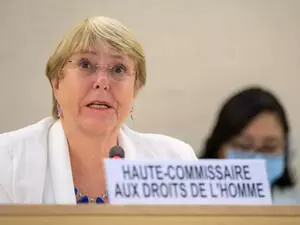
UN human rights chief Michelle Bachelet calls environment threats 'greatest challenge to human rights'
text_fieldsThe UN High Commissioner for Human Rights Michelle Bachelet on Monday said that environmental threats from pollution and climate change will soon become the biggest challenge to human rights. She was speaking at the opening of the 48th session of the UN Human Rights Council in Geneva.
Talking to the UN Council, Michelle Bachelet warned that these environmental threats will intensify to constitute the single greatest challenge to human rights of our era and added that these threats are causing and deepening conflicts across the world.
She called climate change, pollution, and nature loss "the triple planetary crises" and pointed out the recent "extreme and murderous" climate events such as fires in Siberia and California, and floods in China, Germany, and Turkey. The UN Rights Chief noted that drought was potentially forcing millions of people into misery, hunger, and displacement.
"The interlinked crises of pollution, climate change, and biodiversity act as threat multipliers amplifying conflicts, tensions, and structural inequalities, and forcing people into increasingly vulnerable situations," said Bachelet.
"We must set the bar higher – indeed, our common future depends on it," she added. She also noted that countries are consistently failing to take the necessary action to curb climate change.
She also stated that these threats were already "directly and severely impacting a broad range of rights, including the rights to adequate food, water, education, housing, health, development, and even life itself.
"Environmental damage usually hurts the poorest people and nations the most, as they often have the least capacity to respond," said the former Chilean president.
Bachelet said that addressing the environmental crisis is "a humanitarian imperative, a human rights imperative, a peace-building imperative and a development imperative". She added that it is doable and her office would push for more ambitious, rights-based commitments.
The 47-member United Nations Human Rights Council has started its four-week session which will discuss the human rights records of over 40 countries. Nearly 90 reports on a wide range of thematic issues will be presented.






















